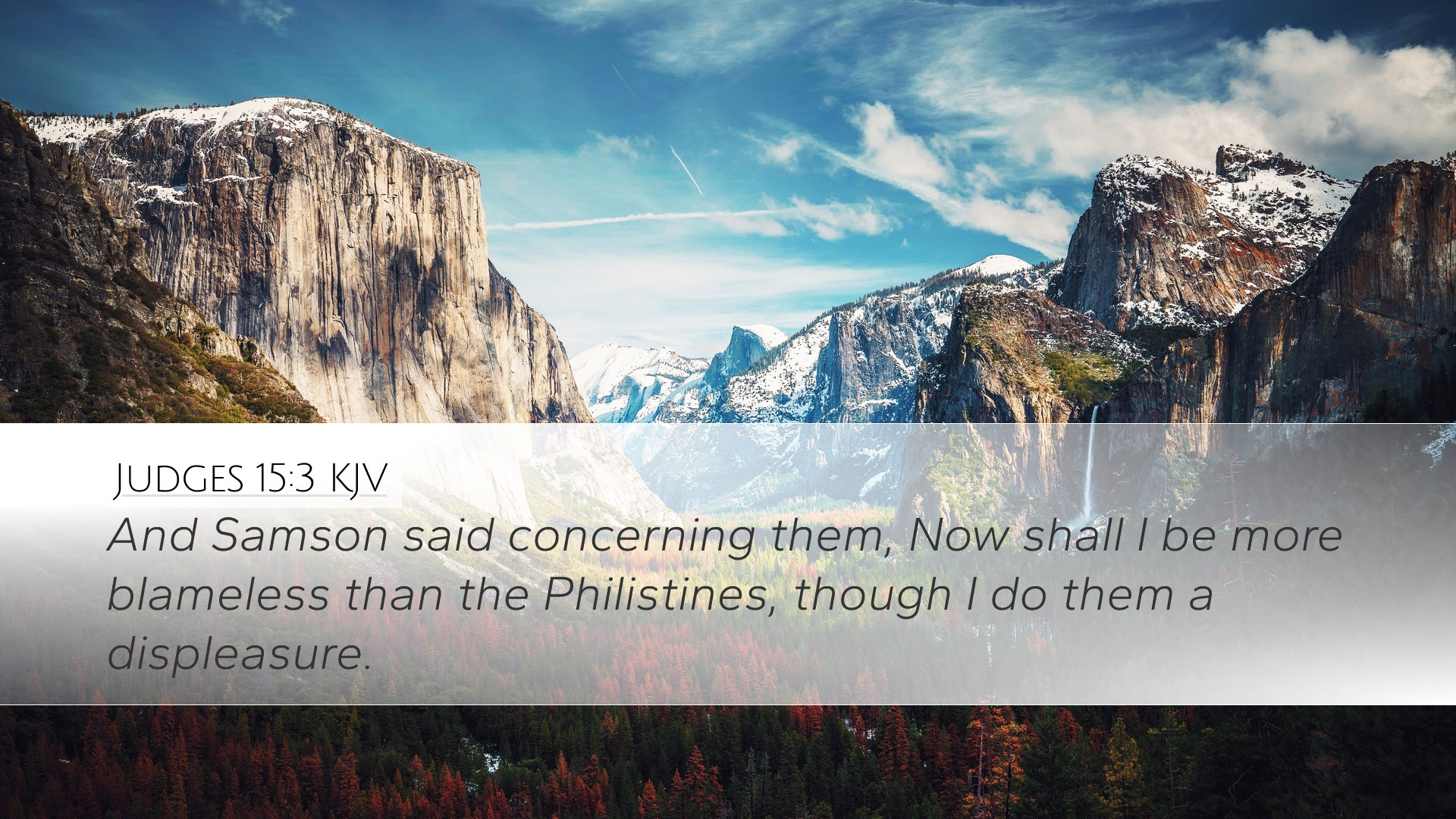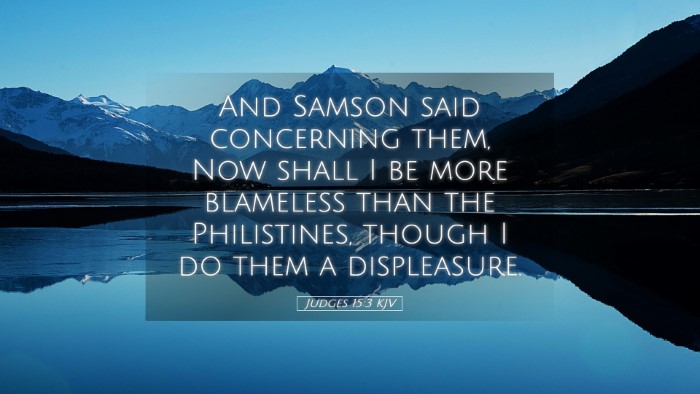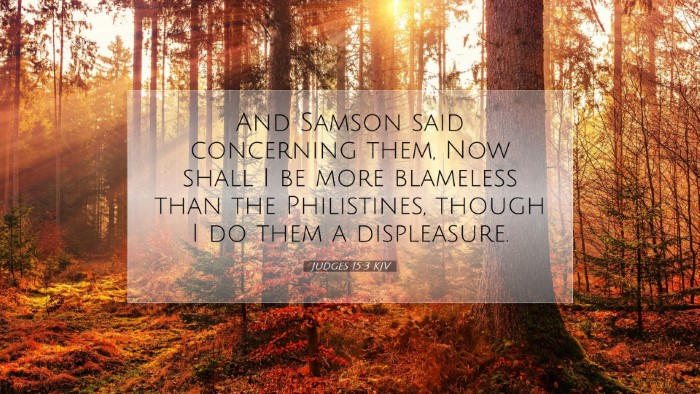Old Testament
Genesis Exodus Leviticus Numbers Deuteronomy Joshua Judges Ruth 1 Samuel 2 Samuel 1 Kings 2 Kings 1 Chronicles 2 Chronicles Ezra Nehemiah Esther Job Psalms Proverbs Ecclesiastes Song of Solomon Isaiah Jeremiah Lamentations Ezekiel Daniel Hosea Joel Amos Obadiah Jonah Micah Nahum Habakkuk Zephaniah Haggai Zechariah MalachiJudges 15:3
Judges 15:3 KJV
And Samson said concerning them, Now shall I be more blameless than the Philistines, though I do them a displeasure.
Judges 15:3 Bible Commentary
Commentary on Judges 15:3
Judges 15:3 states: "And Samson said unto them, Now shall I be more blameless than the Philistines, though I do them a displeasure."
This verse occurs after the events where Samson's wife is given to another man, igniting his fierce wrath and desire for vengeance against the Philistines. The context of this verse is crucial for understanding Samson's character and the larger narrative of Judges.
Contextual Analysis
The Book of Judges describes a cyclical pattern of sin, oppression, confession, and deliverance among the Israelites. Samson, as one of the Judges, exhibits a complex blend of divine empowerment and personal moral failure.
Insights from Commentaries
Matthew Henry
Matthew Henry comments on the impassioned state of Samson at this point. He suggests that Samson’s decision to pursue vengeance stems from a sense of betrayal and a desire to take justice into his own hands. Henry notes that while Samson exhibits righteous anger, his methods reflect human failings, complicating his role as a judge of Israel:
- Vengeful Spirit: Henry emphasizes that Samson's anger leads him to a dangerous mindset, where he believes that his vengeance will justify his actions. He observes that although Samson feels wronged, his sense of justice becomes distorted.
- Divine Purpose: Despite his flawed character, Henry acknowledges that God's purpose is being fulfilled through Samson. God uses Samson’s actions, even when they are born from passion and impulsivity, to enact judgment on the Philistines.
Albert Barnes
Albert Barnes takes a slightly different approach to this verse. He interprets it as an indication of Samson's deep frustrations and his motivation for retaliation against the Philistines, viewing it through a lens of prophetic unrestrained liberty:
- Blamelessness: Barnes highlights the phrase "more blameless," suggesting that Samson is attempting to rationalize his actions. He misinterprets the nature of righteousness, believing that his retaliatory actions would somehow absolve him of guilt.
- Philistine Oppression: Another significant point Barnes makes is regarding the nature of the Philistines’ oppression. He argues that Samson’s fight is not merely personal but a national conflict with significant implications for Israel's freedom from oppressors.
Adam Clarke
Adam Clarke offers an intricate analysis of the emotional and spiritual dimensions of this verse. He delves into the psychological turmoil within Samson, making note of his inner conflict:
- Personal and National Identity: Clarke points out that Samson's identity is closely tied to his actions, suggesting that his grievances stem not just from personal loss but from a broader desire for Israel's liberation.
- Moral Ambiguity: He also stresses the ambiguity of Samson's moral standing. The statement implies that although Samson feels justified in his actions, the morality of revenge and the ensuing violence are in conflict with the principles of divine justice.
Theological Implications
The verse speaks to the broader theological theme of judgment, vengeance, and the complexities of human sinfulness. Here are some implications for the field of theology:
- Human Emotion and Divine Will: The dynamic interplay between human emotion and divine purpose can be observed here. This narrative illustrates how God can use our flawed natures and emotions to fulfill His will, pushing pastors and theologians to consider how God's sovereignty operates alongside human agency.
- Justice and Mercy: The conflict between justice and mercy is another key theme. While Samson feels justified in his anger, the text challenges readers to think about how appropriate justice can sometimes appear vengeful and harsh.
Practical Applications
For pastors and scholars teaching from this verse, several practical applications can be drawn:
- Understanding Anger: It is essential to help congregations understand the nature of anger and vengeance. Samson represents a relatable human struggle, and recognizing this can lead to productive discussions about how to deal with feelings of betrayal and injustice.
- Encouraging Divine Justice over Personal Vendettas: This commentary encourages believers to seek God’s justice rather than personal revenge, reminding them that vengeance belongs to the Lord.
- Call to Repentance and Forgiveness: Additionally, the verse can serve as an excellent starting point for discussions around forgiveness, emphasizing that true blamelessness comes through repentance and reconciliation with God.
Conclusion
Judges 15:3 serves as a poignant reminder of the complexities of human nature and the way that God can use even our flawed desires for His purposes. Through the insights gleaned from the commentaries of Matthew Henry, Albert Barnes, and Adam Clarke, pastors, students, and theologians can engage deeply with the text, exploring the multifaceted issues of justice, emotion, and divine sovereignty.


